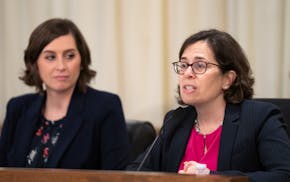Opinion editor's note: Star Tribune Opinion publishes a mix of national and local commentaries online and in print each day. To contribute, click here.
•••
Good legislators — and Paul Marquart was one, for 22 years — are in near-constant conversation with their constituents. They listen, learn and respond. The best of them do a little teaching along the way. Dialogue becomes a habit.
As of January, Marquart has a different role. The Moorhead-area DFLer and former teacher who had been the House's top tax man, the Taxes Committee chair, is now Minnesota's top tax man, the revenue commissioner.
Yet, to his credit, Marquart's conversations persist. When I asked, he willingly shared what he's been hearing from and saying to his former Red River Valley constituents about a key tax proposal that's in play in the final weeks of the 2023 legislative session: whether to exempt some or all Social Security income from the state income tax.
He confirmed what I suspected: A goodly share of the greater Minnesotans he used to represent say they want a full exemption.
"That's understandable," he said. "There's a larger percentage of senior citizens in rural counties than in metro ones."
It's also an issue that resonates in border districts, such as the one he used to represent. Minnesota is one of only 11 states that don't offer full exemption for Social Security income. All of this state's neighbors do.
All tax questions have a partisan tilt, it seems. But this one gets extra Republican weight because it has the potential to divide the Legislature's DFL majorities. A number of DFL legislators, particularly in the narrowly divided state Senate, have voiced support for full exemption of Social Security income from state taxation, the position long held by Republicans.
That sets up the potential for an intra-DFL tax tussle at the end of a session that has seen relatively few such side shows.
Gov. Tim Walz and the House DFL majority have both announced plans for a Social Security income tax cut that falls short of a full exemption. Rather, those plans stretch the current exemption farther up the income scale, so that, in the House's case, only single filers with adjusted gross incomes above $78,000 (married filers, above $100,000) would pay any state tax on their Social Security benefits. The share of Minnesota's Social Security beneficiaries who would pay no state income tax on their benefits would grow from 45% today to about 75% in the House's plan.
That won't be sufficient to satisfy some of Marquart's former constituents. But he wants them to know the difference in cost: Full exemption would take $1.32 billion from state coffers in the coming biennium, compared with the House plan's $409 million. That gap would widen in subsequent years.
In 2024-25, that $900 million difference might go to reducing the cost of child care, cutting taxes for families raising children, beefing up staffing at nursing homes, or providing state aid to cities and counties to keep property taxes down.
Spending of that sort is as popular in greater Minnesota as in the metro area, Marquart said.
"The longer I was in the Legislature, the more I realized that there are a lot more similarities than differences" among Minnesotans, he said. The rural/urban divide has been exaggerated for partisan gain, he maintains. Talk of an emerging generational divide might be too.
"There are a lot of things besides their own taxes that matter to seniors," he said. "The most important thing to the seniors I speak to is making sure their children and grandchildren can enjoy success. They want their families to be able to stay here and thrive."
Walz's budget is built around a goal of reducing child poverty. His proposed increase in a tax credit for families raising children, targeted to those with annual incomes of less than $50,000, is a potent anti-poverty tool, the commissioner said.
That measure deserves particular notice in greater Minnesota, he added, where childhood poverty is a widespread concern. Thirty-five greater Minnesota counties reported higher child poverty rates than did Hennepin County in 2019.
"Child poverty carries with it an enormous long-term cost," Marquart noted, citing lower workforce participation and worker productivity, higher health care and corrections costs and diminished economic activity. "Ending childhood poverty isn't just about kids. It's a One Minnesota issue."
For all the arguments I've heard in favor of full state tax exemption for Social Security income, I've never heard it sold as a One Minnesota idea. Instead, its advocates seem to portray this state's seniors as both gullible and footloose, willing to believe they're paying double taxes on Social Security benefits (they are not) and itching to pack up and leave if they aren't spared a few hundred bucks in state income taxes.
I think Minnesota's Social Security beneficiaries are a better lot than that. But I also think some of them could do with some conversation with a few good legislators on this subject, and that more legislators should be willing and able to do a little tax teaching.
Lori Sturdevant is a retired Star Tribune editorial writer. She is at lsturdevant@startribune.com.

Olson's cheers and jeers: When OLA speaks, it's best we listen
Opinion: The unjust detention of Doğukan Günaydın
Dabney: This 420 is going to be lit

